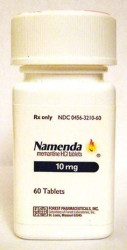Namenda (memantine) Coupons, Discounts & Cost
This drug is indicated for the treatment of moderate to severe stages of Alzheimer's disease. One way to save money on the Namenda retail cost regardless of income and insurance status is to use Namenda coupons or discount cards from RXCoupons. Use this Memantine coupon at this online pharmacy and receive up to 75% off the sale price.
Namenda description and indications
This drug is indicated for the treatment of moderate to severe stages of Alzheimer's disease. In comparison with other drugs, Namenda provides a protective function - the drug regulates the level of glutamate in the brain. This chemical is involved in learning and memory processes. Glutamate activates certain chemicals in the brain, while Namenda supports the activity of glutamate. And this, in turn, improves memory functions. Namenda is the first drug approved for the treatment of severe stage of Alzheimer's disease.
Namenda may cause unwanted side effects such as fatigue, dizziness, decreased consciousness and headache.
Namenda main indications: Alzheimer's disease (mild to severe).
Namenda contraindications
Namenda is contraindicated in the following cases: hypersensitivity to any component of the formulation, severe hepatic insufficiency, breastfeeding, children under 18 years of age.
If you have one of the diseases listed above, you should consult with your doctor before taking this medication.
Patients should use Namenda with caution in case of thyrotoxicosis, epilepsy, convulsions, renal tubular acidosis, severe urinary tract infections caused by Proteus spp., myocardial infarction, heart failure, uncontrolled hypertension, renal failure, hepatic failure. Avoid combination therapy with amantadine, ketamine, dextromethorphan), as well as with gastric antacid drugs.
The potential risk for humans is unknown. Therefore, Namenda should not be used during pregnancy.
Namenda dosage and administration
Memantine therapy should be initiated under the supervision of an experienced physician. The dosage should be reviewed regularly (preferably within the first three months after initiation of treatment). Memantine should be discontinued in the absence of a positive therapeutic effect or intolerance to the drug.
The drug is taken once a day, in the same time, regardless of the meal.
Use the minimum effective dose when you start the treatment. The maintenance dose is 20 mg per day.
Treatment scheme: first week of treatment (days 1-7): use a dose of 5 mg per day; second week of treatment (days 8-14): use a dose of 10 mg per day; third week of treatment (days 15-21): use a dose of 15 mg per day; fourth week: use a dose of 20 mg per day. The maximum daily dose is 20 mg.
Elderly patients (above 65 years old) may not change the doses of the drug.
Patients with moderate renal insufficiency and mild to moderate hepatic impairment may not change the doses of the drug.
The daily dose should not exceed 10 mg in severe renal insufficiency.
Namenda side effects
Side effects ranging from mild to moderate severity: dizziness, headache, constipation, drowsiness and hypertension.
Central and peripheral nervous systems: common - headache, dizziness, drowsiness; rare - fatigue; very rare - seizures, convulsions, depression, anxiety, sleep disturbances, confusion, agitation, hallucinations; frequency not known - psychotic reactions, suicidal thoughts.
Cardiovascular system: high blood pressure; uncommon - venous thrombosis, thromboembolism, valvular heart disease, congestive heart failure.
Gastrointestinal tract: common - constipation; uncommon - nausea, vomiting; frequency not known - pancreatitis.
Liver and biliary tract: frequency not known - hepatitis.
Respiratory system: common - shortness of breath.
Infections: uncommon - fungal infections.
Immune system: common - hypersensitivity to the drug.
Other reactions: uncommon - general weakness, allergic reactions.
Inform your doctor if any of these side effects are severe, or if you notice any other side effects not mentioned in the instructions.
Some patients may have symptoms of depression and suicidal thoughts.
Symptoms of overdose: fatigue, weakness, diarrhea, confusion, drowsiness, dizziness, aggression, hallucinations, nausea.
Namenda special instructions
Namenda should be used with caution with levodopa, dopamine receptor agonists, barbiturates, neuroleptics.
Namenda may change (increase or decrease) the effect of antispasmodic drugs.
Avoid simultaneous reception with amantadine, phenytoin, ketamine and dextromethorphan.
Other drugs such as cimetidine, ranitidine, quinidine, procainamide, quinine and nicotine may also interact with memantine.
Memantine may increase the excretion of hydrochlorothiazide.

